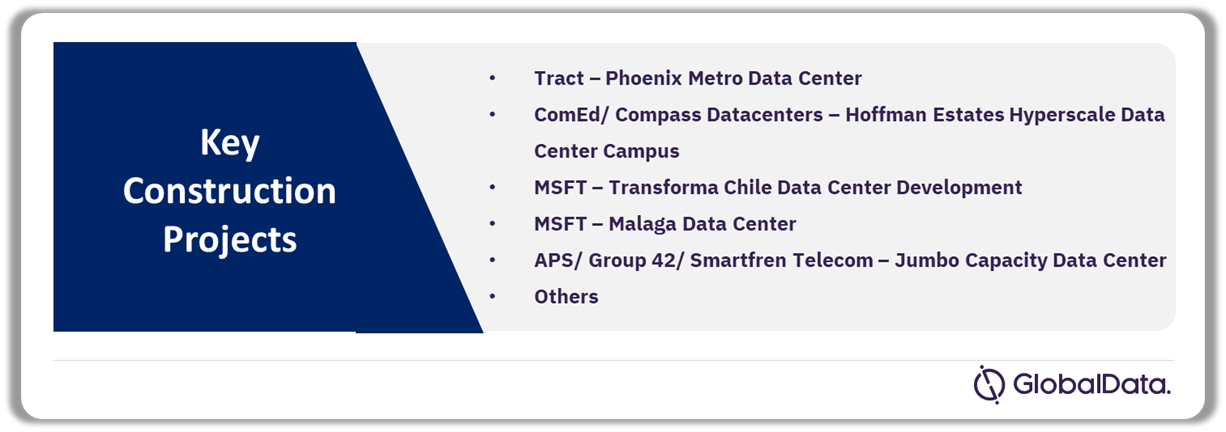Explore the growing Data Center Construction Projects Market, including key trends, market drivers, challenges, and future opportunities. Learn about the latest innovations, technological advancements, and the impact of sustainability in this booming sector.

Buy the Full Report for More Designer and Consultant Insights into the Data Center Construction Market Download a Free Report Sample
Market Dynamics
1. Market Drivers
Several key factors are driving the growth of the data center construction projects market:
-
Cloud Computing Growth: The global shift to cloud-based services is one of the primary drivers of data center construction. Cloud providers require extensive infrastructure to support their growing services. Companies like Amazon Web Services (AWS), Microsoft Azure, Google Cloud, and others are continuously expanding their data center networks to meet the increasing demand for cloud services.
-
Big Data and AI: The rise of big data analytics and AI has necessitated more powerful and efficient data centers capable of handling massive data processing tasks. Data centers now require high-performance computing (HPC) capabilities, robust networking, and low-latency operations to meet the demands of AI and machine learning applications.
-
Edge Computing: Edge computing is a rapidly emerging trend that involves processing data closer to the point of origin rather than relying on a centralized cloud server. As IoT devices proliferate and demand faster data processing speeds, edge data centers are becoming increasingly common, particularly in industries such as manufacturing, healthcare, and autonomous vehicles.
-
Data Sovereignty and Security: With rising concerns about data privacy and security, governments and organizations are focusing on complying with data sovereignty regulations. This has led to a surge in data center construction within specific regions to ensure that data is stored and processed in compliance with local laws.
-
5G Networks: The rollout of 5G networks is expected to increase the demand for data centers, particularly small data centers located closer to end users. The low latency and high-speed capabilities of 5G technology require advanced data infrastructure to support the transmission and processing of data across a large network of devices.
2. Market Challenges
While the data center construction industry is poised for significant growth, there are several challenges that stakeholders must overcome:
-
Rising Energy Costs: Data centers are notorious for their high energy consumption. With the increasing focus on sustainability, there is pressure on operators to build energy-efficient data centers and adopt renewable energy sources to minimize their environmental impact. However, the costs associated with implementing green technologies can be substantial.
-
Land and Space Limitations: As demand for data centers grows, finding suitable land for construction, particularly in urban areas, has become increasingly challenging. Land scarcity and rising property prices are factors that limit the ability to scale operations and add new data centers.
-
Skilled Workforce Shortage: The data center industry requires a highly skilled workforce to design, build, and operate complex data infrastructures. The shortage of qualified professionals in fields such as electrical engineering, network architecture, and data management can delay construction projects and increase labor costs.
-
Regulatory Hurdles: The data center industry is subject to a complex web of local, national, and international regulations. Navigating these regulations, especially when it comes to data privacy, environmental standards, and building codes, can be a significant challenge for developers and operators.
3. Market Opportunities
Despite these challenges, there are numerous opportunities for growth within the data center construction market:
-
Green Data Centers: The growing demand for sustainable data centers presents significant opportunities for innovation. Green data centers that utilize renewable energy sources, energy-efficient cooling systems, and advanced power management technologies are gaining traction. Companies that can design and build data centers with minimal environmental impact stand to benefit from both cost savings and positive brand perception.
-
Modular and Prefabricated Data Centers: Modular and prefabricated data centers offer a flexible and cost-effective solution to meet the growing demand for data infrastructure. These systems can be deployed quickly and scaled as needed, making them an attractive option for both established players and new entrants in the market.
-
Hyperscale Data Centers: Hyperscale data centers, which are massive facilities designed to house tens of thousands of servers and support large-scale operations, are in high demand. These centers are particularly popular among cloud providers, social media companies, and tech giants. Developing specialized hyperscale facilities presents a major growth opportunity for construction firms.
Key Trends in Data Center Construction
-
Automation and AI Integration: Automation technologies are increasingly being integrated into data center operations to improve efficiency and reduce human error. AI-driven predictive analytics are being used to optimize energy usage, monitor system performance, and improve overall reliability.
-
Liquid Cooling Technologies: Traditional air-based cooling systems are being replaced with liquid cooling technologies that offer more efficient heat dissipation and lower energy consumption. This innovation is becoming particularly important for hyperscale data centers.
-
Sustainability and Carbon Neutrality: There is a growing emphasis on sustainability in the data center construction industry. Many companies are committing to achieving carbon neutrality and using renewable energy sources, such as solar and wind power, to operate their facilities.
-
Security Enhancements: As cyber threats become more sophisticated, data center operators are investing in advanced security measures, including biometric access controls, surveillance systems, and fire suppression technologies to safeguard critical infrastructure.

